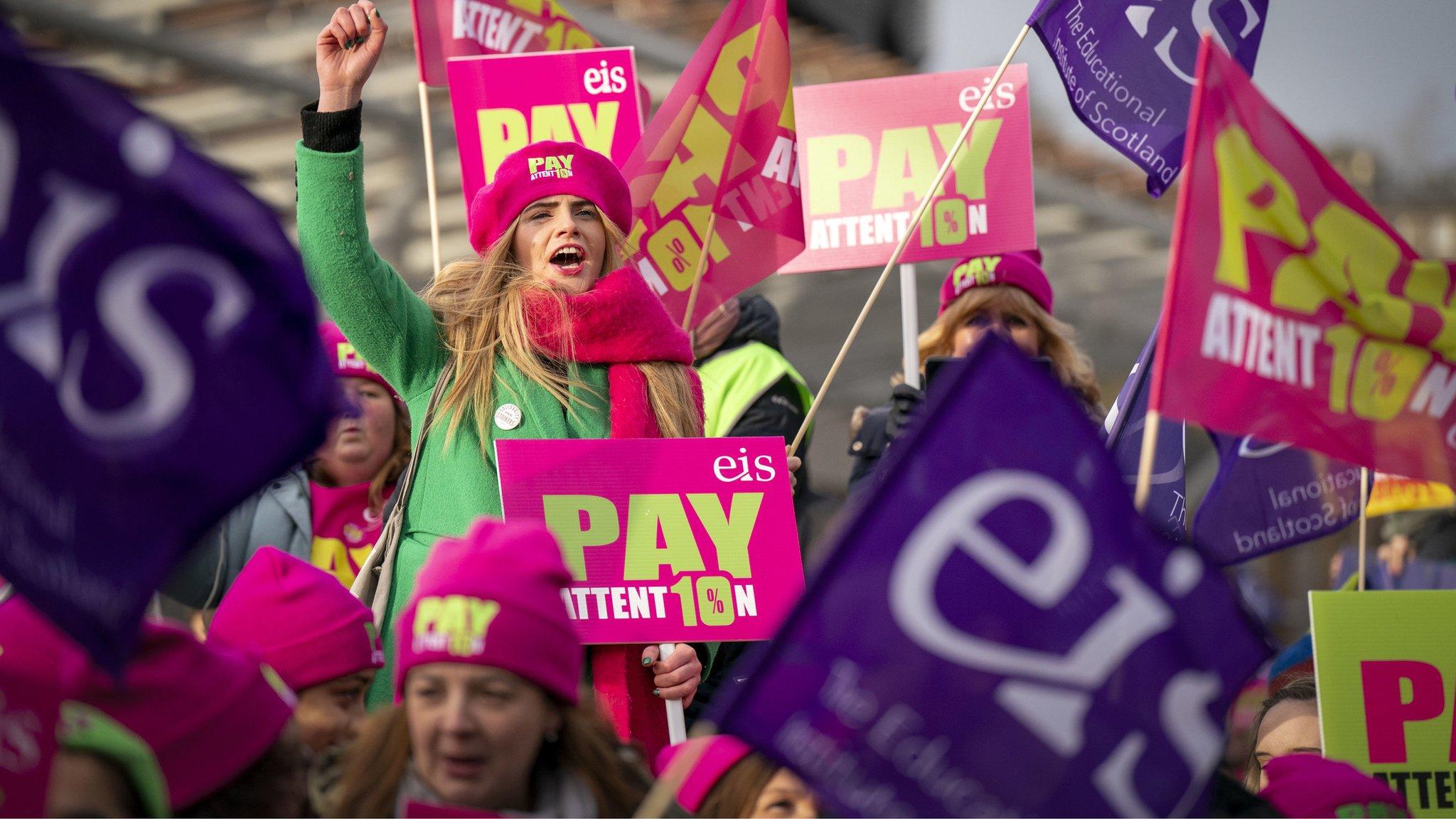Teachers' strike: 'No stone left unturned' - Somerville
- Published
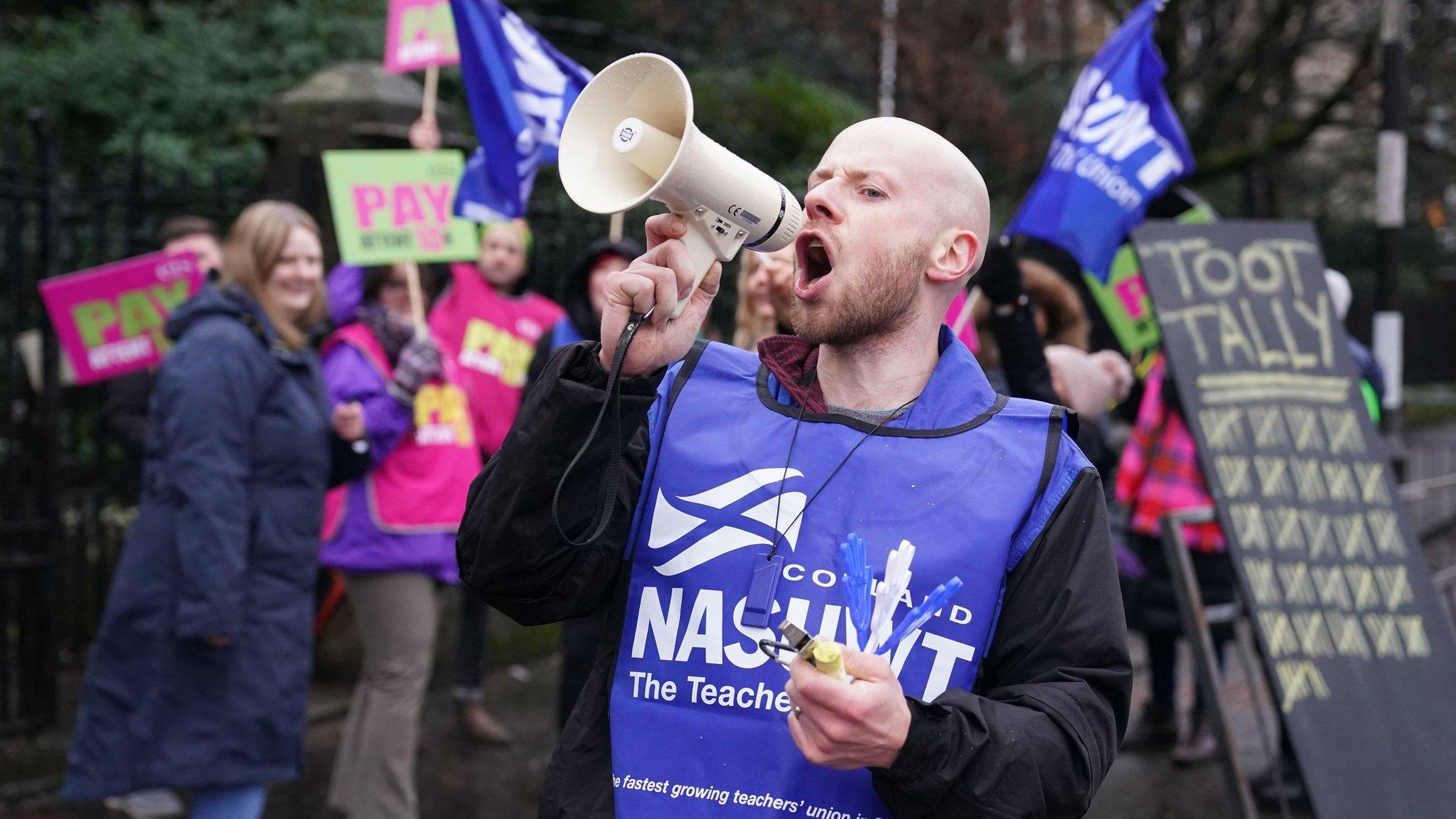
Scotland's education secretary has said she will leave "no stone unturned" to bring about a quick resolution of teacher strikes affecting schools across the country.
However, Shirley-Anne Somerville said there was still "some distance" between the two sides in the pay dispute.
She told MSPs: "No-one wants to see strike action in our schools."
Most of Scotland's primary schools were shut on Tuesday and secondary schools will be closed on Wednesday.
Last-ditch talks between unions and Scottish government officials held on Monday failed to prevent the strike action.
The strikes involve members of the Educational Institute of Scotland (EIS), NASUWT, Scottish Secondary Teachers' Association (SSTA) and the Association of Headteachers and Deputes (AHDS) unions.
They have rejected a 5% pay increase, arguing for 10%. The latest offer includes rises of up to 6.85% for the lowest-paid staff.
As the Scottish Parliament resumed following the winter recess, Conservative Stephen Kerr spoke about Monday's talks.
"Teachers are on strike for the first time in 40 years, because this SNP government has repeatedly let them down," he said.
Sides in teacher pay talks 'some distance apart' - education secretary
Ms Somerville said the talks had been "constructive", adding that she could not give further details while negotiations were ongoing.
Referring to "anti-trade union" legislation at Westminster, she said: "I will take no lectures from Mr Kerr or any other Conservative member of this parliament, saying that we should be doing more to actually settle disputes."
The Lib Dems' Willie Rennie asked if there would be a new offer for teachers, saying: "The education secretary does seem to be very chilled out and relaxed."
Ms Somerville said both sides in the dispute would have to compromise in order to reach a resolution, adding: "We will, of course, leave no stone unturned to try and do that as quickly as possible."
She previously told the BBC the union pay demands were "simply unaffordable".


Solving industrial disputes amicably nearly always means both sides compromising. So what scope is there for reaching a settlement on teachers' pay?
The gulf between the two sides is wide: a 10% pay claim and an offer worth between 5% and 6.85% for most.
Unions are hopeful a new pay offer will be made later this week.
The question is how the unions may respond.
If the new offer is a significant improvement on the current one, they may call off next week's strikes as a token of goodwill and ask their members to vote on whether to accept it.
But if the new offer is disappointing and dismissed quickly, it could actually inflame the dispute.

Mike Corbett, national Scotland official of the NASUWT union, said: "The fact we are talking is progress itself but I have to say there is still quite a distance between what is on the table and what teachers are looking for.
"The last offer was dressed up as an improved offer but it remained, for the vast majority of teachers, the 5% offer that had been around for months."
Mr Corbett said that historically teacher pay had been getting "worse and worse" since 2010 and that was reflected in the recruitment and retention figures.
The EIS said it was still hoping for fresh talks and a resolution before more strikes go ahead next week.
Its general secretary Andrea Bradley said: "Only a significantly improved offer from the Scottish government and Cosla can bring an end to this dispute."
The views of parents and carers

Kelly Robertson's eldest daughter has trouble adjusting when her routine is changed
Kelly Robertson, from Aberdeen, has two young daughters Georgia-Rose, 7, and Ellie-Jane, 5.
Her eldest daughter needs set routines as she is on the autism spectrum so finds it difficult to adjust when the school shuts in the middle of the week.
"She needs to be at school Monday to Friday so for her to be off school in between the week, rather than a Friday or a Monday - a long weekend - it just totally knocks her," Kelly said.
She said she had kept Georgia-Rose off school on Monday rather than going in then being off again "otherwise her whole week would be up in arms".
"She gets really upset when she gets up in the morning and doesn't realise there's no school but its not a weekend so her dad's not home," Kelly said. "So that knocks her whole day off. That then upsets her little sister because she doesn't understand why there's no school."
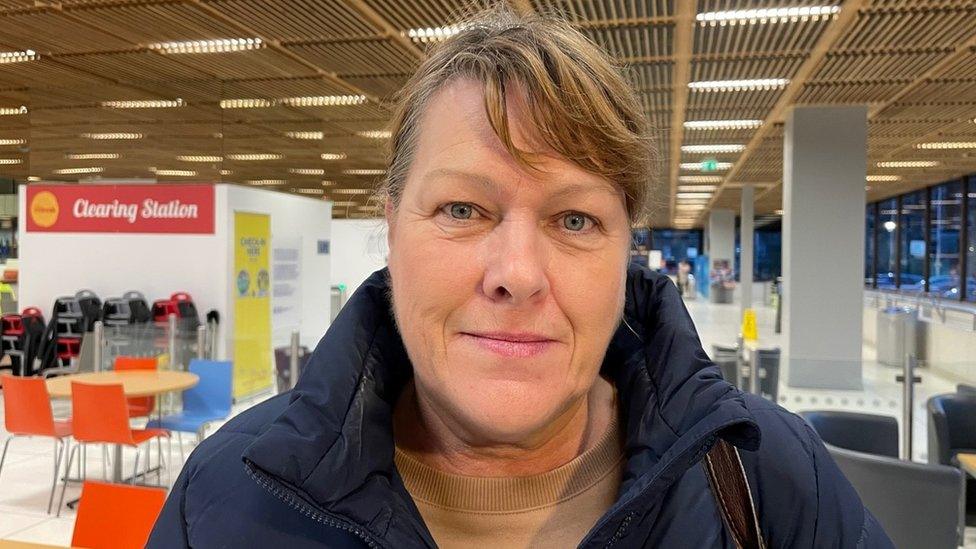
Carer Janice James says she supports the teachers
Carer Janice James, from Edinburgh, told BBC Scotland: "As a carer it is a massive disruption because not only today with the primary schools but tomorrow with the high schools so it's got a massive knock-on effect for parents, carers and grandparents."
However, she supports the strike.
"I think it's right that they're going out on strike and they should get what they're asking for," she said.
Parent Russell Cobden said: "I can't say I agree with the strike but they deserve better pay."
And Laura Cogan, also a parent, said she completely supported the teachers and felt the government should be "pulling out all the stops" to resolve the dispute.

Amanda Murray said the real-term value of teachers' pay had fallen hugely
Among those on the picket lines was Amanda Murray, an additional support needs teacher at Orchard Brae in Aberdeen.
"It's very frustrating that it's got to this stage because these pay discussions opened almost a year ago back in February," she said.
"We're now in January 2023 and still waiting for our pay increase and in the meantime inflation has seen the real-term value of teachers wages decrease hugely.
"All we're asking is for our wages to be kept in line with inflation so we're not losing out."
She said the job was "exhausting" and that it would be nice to have their efforts reflected in their pay.
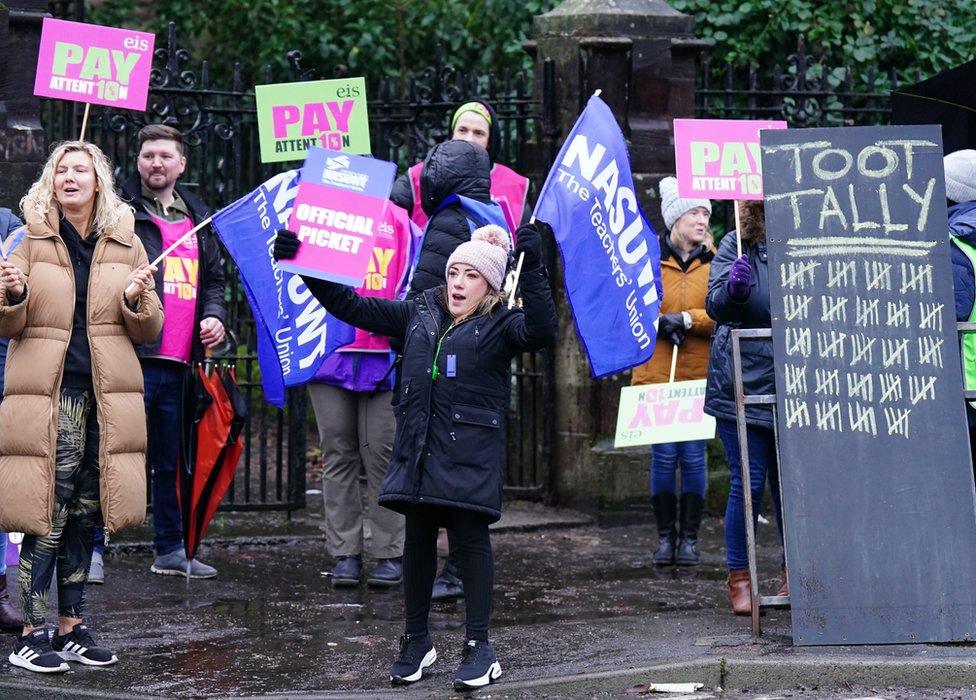
Drivers have been beeping their horns in support of the striking teachers
If no agreement is reached, teachers in Scotland plan to strike on a further 16 days, beginning next week.
The consecutive days of action - split across every council in the country - will take place throughout January and February.
Teachers in two local authorities will strike on each of the 16 days.
The industrial action follows the biggest Scottish teachers' strike in decades in November.
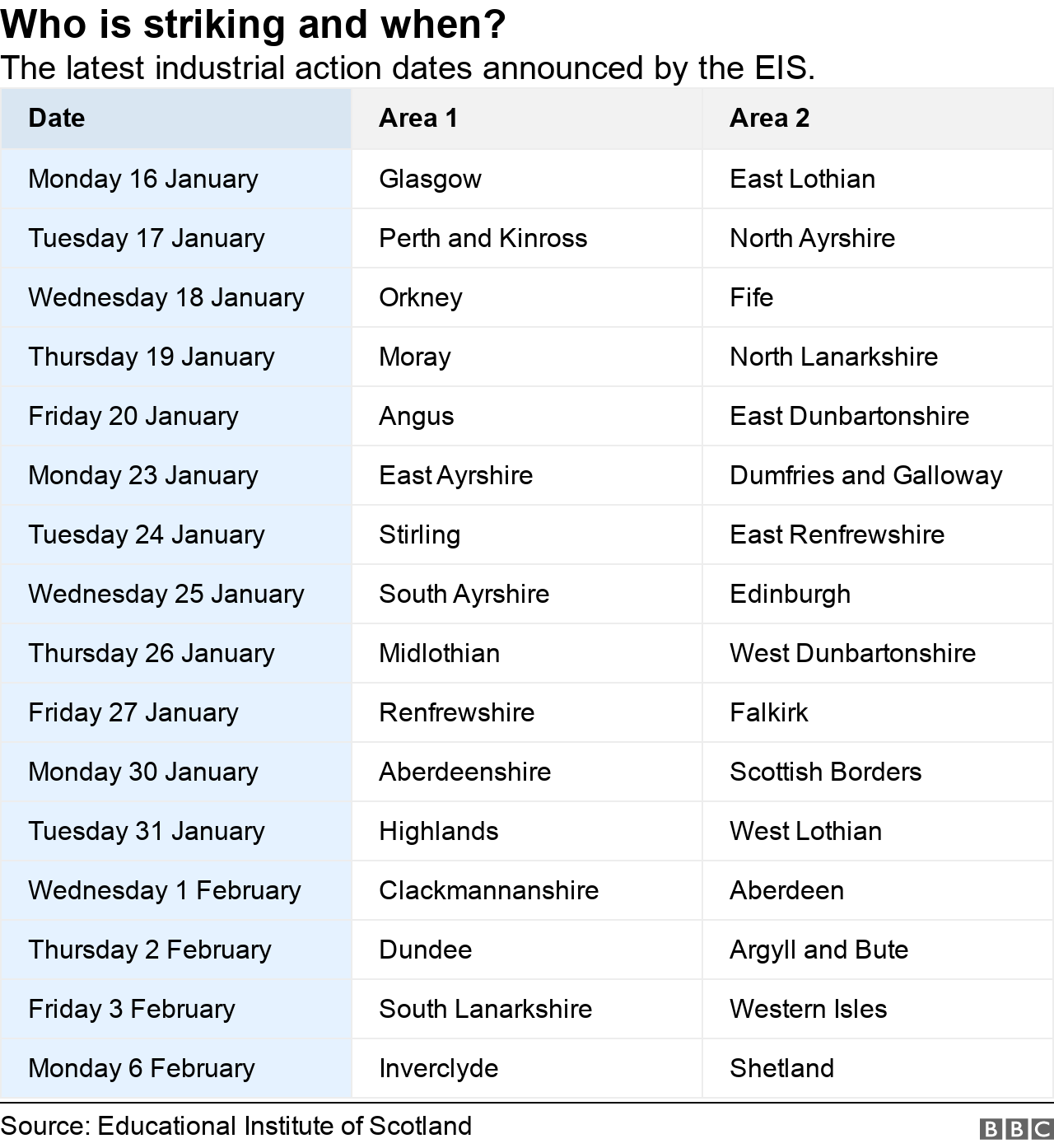
Most state-school teachers in England and Wales were given a 5% pay rise in 2022. In Northern Ireland many teachers have been offered 3.2% for 2021/22 and 2022/23.
But unions argue that inflation above 10% means these increases amount to pay cuts.
Teaching unions in England and Wales are balloting members over pay.
And teachers from five unions in Northern Ireland are continuing to take action short of a strike - affecting meeting attendance and administrative tasks.

Are you taking part in the strikes? Are you a parent who is affected by the industrial action? Email: haveyoursay@bbc.co.uk, external.
Please include a contact number if you are willing to speak to a BBC journalist. You can also get in touch in the following ways:
WhatsApp: +44 7756 165803, external
Tweet: @BBC_HaveYourSay, external
Or fill out the form below
Please read our terms & conditions and privacy policy
If you are reading this page and can't see the form you can email us at HaveYourSay@bbc.co.uk, external. Please include your name, age and location with any submission.
- Published10 January 2023
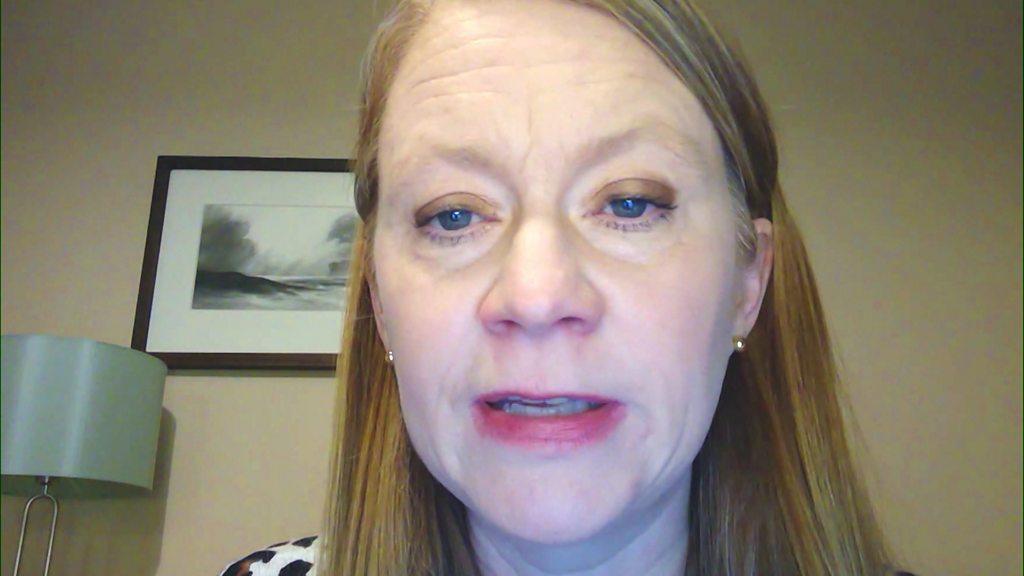
- Published9 January 2023
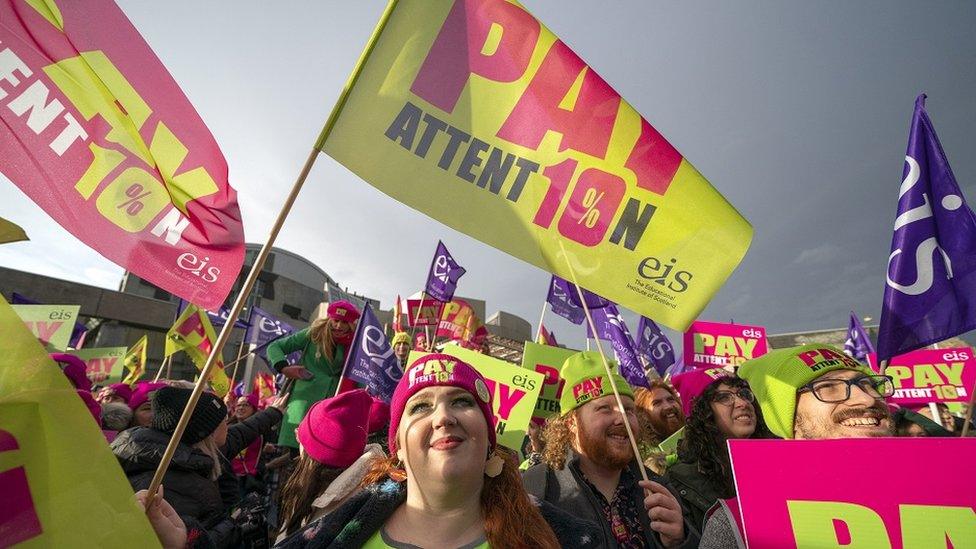
- Published6 January 2023
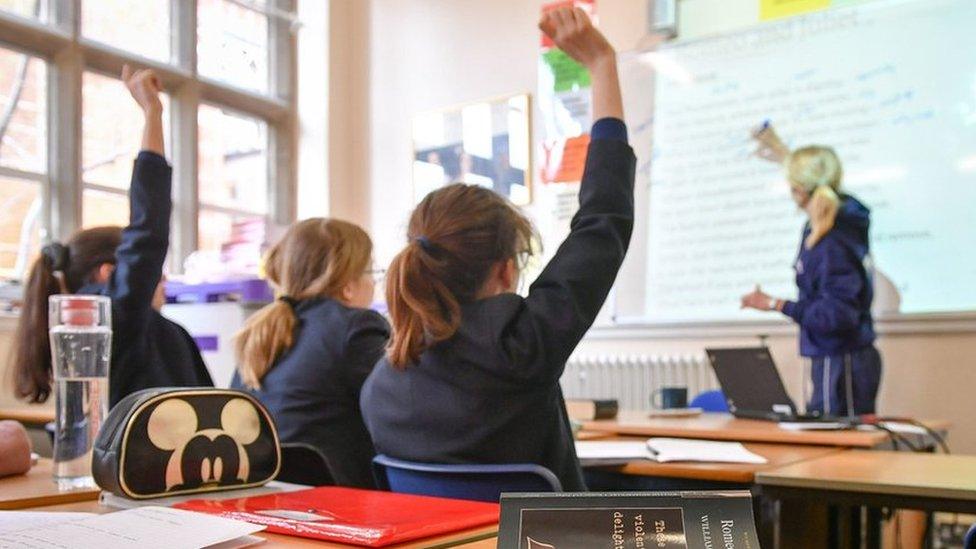
- Published7 December 2022
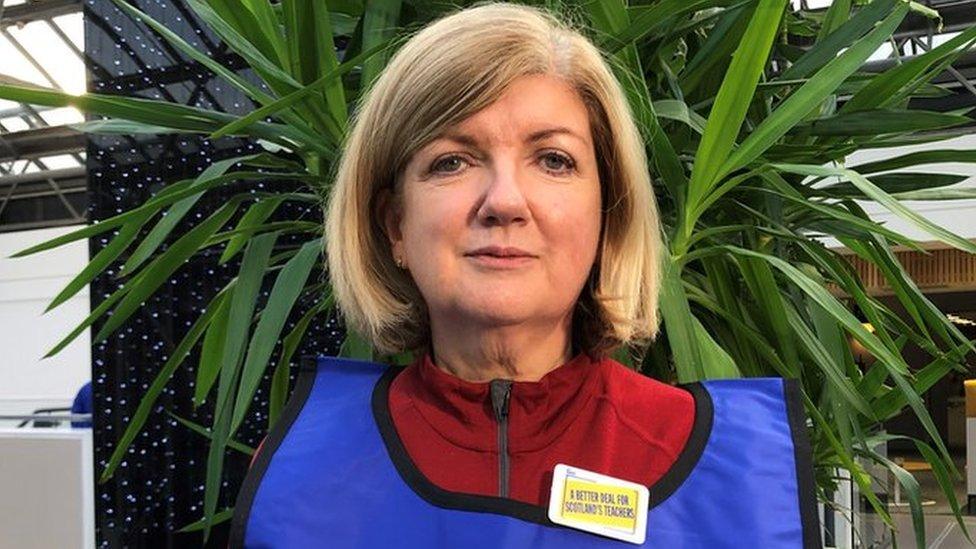
- Published24 November 2022
